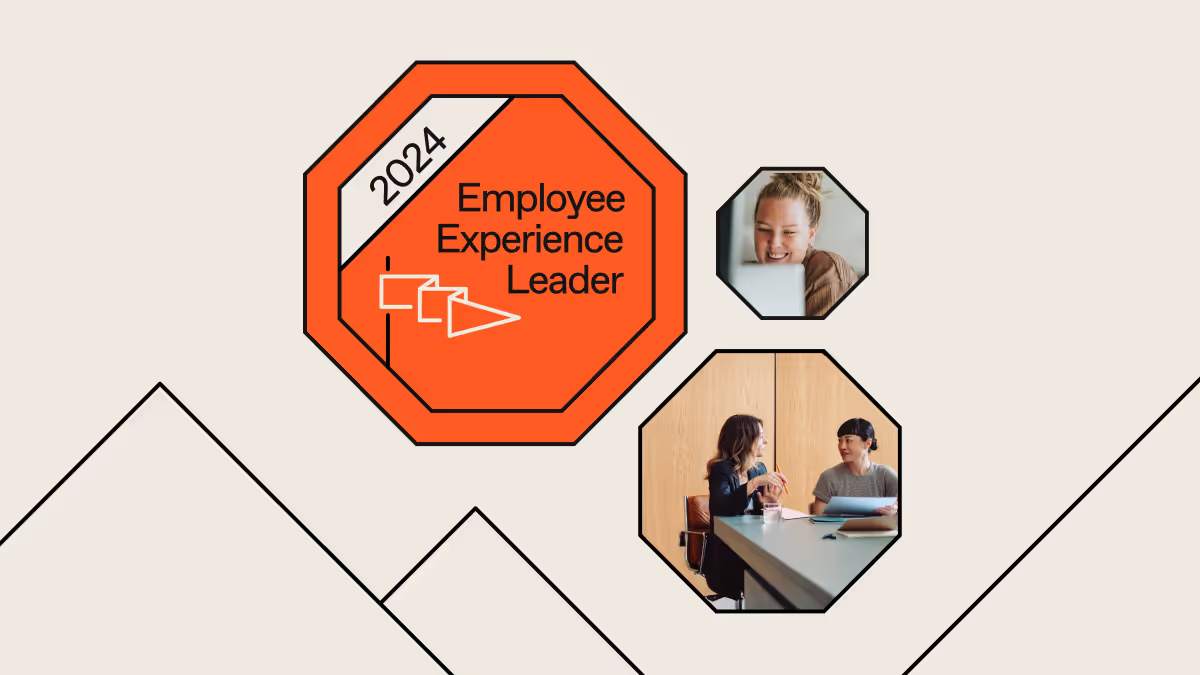Why is employee experience important?

Discover Workleap Officevibe's benchmark report on 12 key employee engagement metrics

A positive employee experience (EX) is the beating heart of business performance. Successful companies need dedicated, productive employees to ensure better business outcomes. And those employees need their leaders to value their efforts and nurture a constructive work environment.
If you're not sure where your company stands, take a moment to reflect. Do your employees feel valued, supported, and motivated to do their best work? Or are they just going through the motions, counting down the hours until they can clock out?
As an HR leader, you know the former is worth its weight in gold. But it can sometimes be difficult to make your case for EX resources when other leaders don't fully understand why employee experience matters.
That's where we come in as your trusted sidekick. We put together a list of the top eight reasons why companies should place more importance on employee experience and how to reach the EX pinnacle.
What is employee experience?
We're witnessing big shifts in the labor market and global economic landscape this year. With this, top talent in various fields realize they have more freedom than they thought regarding job choice. To attract and retain employees, managers and team leaders play a critical role in prioritizing employee experience.
So, what exactly is employee experience? Put simply, employee experience encompasses every interaction a person has with their organization at every stage of their employee lifecycle. From the initial hiring process to their exit interview, an employee's experience shapes their perception of your company and may reflect the current condition of your work environment.
Several factors make a great employee experience, including physical space, company culture, learning and development opportunities, relationships with their managers, and more. By investing in the employee journey, you can set your team up to succeed at critical moments.
Identify important moments during employee experiences that affect your people and business outcomes by learning to map the employee experience journey (psst: we included a template and example to help you out).
8 Reasons why employee experience is important
Creating a positive employee experience requires time and effort, but the payoff and employee engagement you'll get out of it are worth it. Statistics on employee experience show that an engaged workforce can lead to increased productivity, improved employee well-being, and superior customer experience. Unsurprisingly, your business benefits from having happy employees!
Read on to learn why employee experience is important for your company's growth and long-term success.
1. Attracts top talent
People are thinking more carefully than ever about how they choose employment. Above average salaries might attract some job seekers, but it'll no longer be the main reason top talent flock to your door. Instead, many individuals will look to employee satisfaction rates, company culture, and ambassadorship levels to determine whether a role at your company is right for them.
In short, a great employee experience gives you an edge in the job market by making your organization stand out in a sea of employers, and by retaining these new hires in the long run. More on that later!
2. Boosts productivity
Individual and team productivity are top of mind for leaders these days. Organizations need their employees to do great work and contribute towards broader goals. But productivity shouldn't be taken for granted. Leaders and organizations play a big role in helping employees be and stay productive.
Fostering a constructive employee experience is key. It motivates employees to do their best work, leading to improved individual performance. And it doesn't stop there. A solid employee experience also makes collaboration flourish, resulting in better communication and shared problem solving — both of which do wonders for improving team productivity.
3. Fosters great team relationships
Employee experiences founded in trust, communication, respect, and recognition are the most conducive to sparking positive relationships at work. When you start prioritizing these 4 pillars of employee relations within your employee experience, you'll unlock a slew of benefits for each team and the company as a whole.
Employees who trust each other and work well together are more likely to address challenges more effectively and bounce back from setbacks more quickly. They're also better at generating creative ideas collectively and finding innovative solutions together.
Great employee experiences create 5-star teams that are resilient and adaptable, and drive everyone around them forward.
4. Improves employee well-being
HR leaders everywhere recognize that most employees' mental health influences if and how they show up to work. However, well-being in the workplace is increasingly difficult to manage because of how entangled work currently is in our personal lives. Most of us still work in the same environment where we eat, sleep, relax, and spend time with our loved ones. Because of this, organizations need to be extra intentional about how they address wellness in their employee experience.
Companies that prioritize flexibility, psychological safety, work-life balance, and employee autonomy, for example, are more likely to have a workforce full of employees who feel their best and give their best at work. That's because these key employee experience factors give employees the support they need to flourish creatively and feel more engaged in their work.
😓 Has someone on your team fallen victim to burnout? Help get them back on track and protect the rest of the team's well-being with a psychologist's tips on how to manage burnout.
5. Improves customer satisfaction
Have you ever been served by a waiter who was clearly having a bad day? We can bet their demeanor or subpar customer service clouded your experience. Even when it's controlled, it's hard for people to avoid letting their mood impact their behaviors. It's simply human nature.
The same way an unhappy waiter can kill the vibe of an otherwise good dinner, disengaged and unhappy employees can negatively impact a paying customer's satisfaction. And when the customer is dissatisfied, the business suffers.
On the flip side, engaged employees who have favorable experiences at work are more likely to produce better quality work, foster better client relationships, and positively represent your brand. Like a domino effect, you can ensure a better customer experience by collaborating with your team at every step in the employee journey.
[ov_cta id="5118841"]
6. Strengthens employer brand
Businesses these days have to consider the possibility of employees speaking negatively about them online. We know this is stressful, but on the bright side, the reverse is also true. Accounts detailing positive experiences at your organization can establish a good reputation for your brand and encourage others to join you. This applies to word-of-mouth, too! Happy, engaged employees are more likely to speak highly of their workplaces and strengthen their employer brands.
Look at these two online reviews for instance:
⭐️⭐️⭐️⭐️ Great team culture and lots of room for growth
I've been working at Zebra company for 3 years now, and I'm still loving my experience! I have a great relationship with my managers, and they're always looking to improve collaboration and communication at work. Since joining, I've also had the chance to take on a new role, do stretch assignments, and sign up for relevant trainings.
⭐️⭐️ Long hours and lack of direction from leaders
I used to love working at Tiger company, but lately the management team is super unorganized and it feels like no one is aligned. There's always a false sense of urgency, which makes employees work longer hours than necessary. I don't feel valued and my work-life balance is terrible.
Now, which of these two describes a better employee experience, and which do you think is more likely to boost your employer brand? Case closed.
7. Increases employee retention
When you create a fantastic employee experience, you send the message that you're invested in every employee's journey. You're telling your team that you want them at your side, and not just for the time being. If you're figuring out how to improve employee retention, you can start by tackling two great places in the employee experience: feedback and career advancement options.
More honest feedback from your team will give you the insights you need to make adjustments moving forward, so you can create a virtuous cycle of employee experience and retention improvement. Likewise, giving your employees the opportunity to learn new skills and consider internal mobility shows that you're invested in their future. As a result, they'll feel more invested in the company and their position. And they'll be more likely to see a future with your organization in it.
Gather valuable feedback to tackle retention at its core with these 20 employee retention survey questions.
8. Decreases absenteeism and presenteeism
In most cases, a positive employee experience also leads to less absenteeism and presenteeism at work. In other words, employees are less likely to take time off for reasons other than vacation, and those who are present are less likely to be mentally checked out. That's because employees who feel fulfilled at work and genuinely enjoy their workplace have a stronger sense of commitment and motivation towards their work.
When employees are absent from work, they can miss important tasks, meetings, or deadlines, which can cause delays and avoidable added stress for their colleagues. Similarly, when employees are present, but mentally elsewhere — usually due to stress, poor mental health, or lack of motivation — the team's global productivity and employee engagement levels can take a hit.
In the end, everyone wins when you create a supportive and engaging work environment.
What is a positive employee experience?
A positive employee experience is one that people feel a strong sense of connection to and satisfaction with. Looking at it in more detail, the employee experience is shaped by 11 key pillars, each of which should be given care and attention.
Identifying where you stand with each pillar is the first step towards building a positive employee experience. However, as workplace expectations change, it's important to regularly reassess what your employees need.
Fine-tuning your approach will take some practice, but in the meantime, here are some factors to consider:
- Tools and office space: Do your employees have everything they need to do their jobs well? This includes technology, support from managers and team members, and adequate resources. Likewise, having both private and collaboration spaces provides employees with appropriate work areas for team projects and individual tasks.
- Company culture: Whether in their personal lives or at work, everyone wants to feel included, respected, and valued. This is why it's necessary to build an organizational culture that's human-focused and able to adapt to individual needs. Establishing a positive workplace culture is also where tools like team-building activities come in.
- Communication: Frequent, open communication organically develops trust between team members and managers. Even better, it ensures that everyone is on the same page and inspires more productive and effective collaboration.
Ultimately, the objective of improving employee experience is to engage people and provide them with the psychological safety they need to voice thoughts and feelings. Taking an iterative approach to employee experience rooted in feedback and communication is the best way to keep employees happy and the business thriving for good.
How to improve the employee experience
Struggling to improve employee experience at your organization? Don't worry. Below, we've compiled a list of simple ways you can get the ball rolling.
Create stellar onboarding
One of the easiest ways to improve employee experience from the jump is to create a stellar onboarding process.
A person's onboarding is their official introduction to their new work environment and colleagues. It sets the tone for the rest of their tenure at a company, so it's important to make those first moments count.
Remember that the onboarding process should smoothly integrate new hires into your midst. This means helping them bond with the team, personalizing their onboarding activities, and introducing them to your company's values.
Ensure role clarity
A common concern for employees is not having a clear understanding of their roles. It drives confusion, decreases accountability, and demotivates employees. That's why clearly identifying each team member's role and responsibilities is key to improving your employee experience.
Once each employee understands their role, you can then set goals they can work to achieve. It's helpful to have one-on-one meetings whenever possible to clarify roles and responsibilities.
Use employee feedback loops
By creating a regular feedback loop, you can better understand how employees feel about their work environment, job responsibilities, relationships with peers and managers, and company culture. In other words, you can uncover their needs and they can understand your expectations.
Feedback loops help spot areas of improvement on all ends, giving employees, managers, and HR leaders tools to enhance the over experience at work.
Make employee well-being a priority
It's a simple fact that happy people perform better and have higher employee satisfaction. On the other hand, elevated anxiety, burnout, and stress in the workplace can be a recipe for disengagement.
To improve the employee experience, you'll need to get a clear sense of your team's well-being. The best way to do so is to conduct an employee wellness survey.
These employee surveys open up a line of communication between you and your team members and give you the insights you need to make necessary changes. Depending on the answers you receive, these changes could be implementing more flexible scheduling, moving to a hybrid work model, or expanding employee benefits.
Make time for team building and strengthening connections
For communication to be effective, it's necessary to establish a sense of trust between your employees and management.
Team-building exercises show your employees that you value their perspective and presence. At the same time, coworkers can form meaningful bonds, which lead to improved collaboration, communication, employee engagement, and overall productivity. When people feel a strong connection to their workplace, the employee experience naturally increases.
Trust is one of the most essential ingredients to a team's success. Make your team trust rock-solid with these 5 strategies to build trust and collaboration.
Start creating an outstanding employee experience
Investing time and effort in the employee experience is no longer optional for businesses that want to succeed in the modern world. As we outlined above, creating a well-rounded and carefully crafted employee experience can help companies attract top talent, increase employee performance, and keep clients happy, among many other benefits.
As an HR leader, you play a critical role in shaping the employee experience at your organization. The best practices we shared are a great starter pack to initiate your employee experience strategy. And if you need a tool to help you along the way, Officevibe's intuitive employee experience platform can measure your team's employee engagement and show you how to take action to improve it.
You got this! All you need to do is start. Your team and business will thank you for it.
Give HR and managers the clarity, confidence, and connection to lead better every day.












